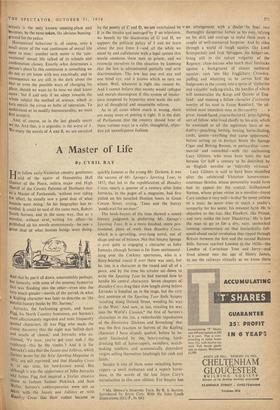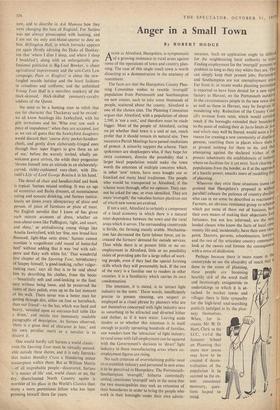A Master of Life
By CYRIL RAY His fellow early-Victorian country gentlemen said of the squire of Hamsterley Hall (Justice of the Peace, militia major and High 1 Sheriff of the County Palatine of Durham) that as a Master of Foxhounds, 'without ever riding for effect, he usually saw a good deal of what hounds were doing.' So his biographer has re- corded. It could be said of the same man, Robert Smith Surtees, and in the same way, that as a novelist, without ever, writing for effect—he Published all his novels anonymously—he saw a great deal of what human beings were doing.
And that he put it all down, amateurishly perhaps, but honestly, with none of the smarmy hypocrisy that was flooding into the other—even into the very much greater—novels of the period, in what a Kipling character was later to describe •as 'the natural-history books by Mr. Surtees.'
Jorrocks, the foxhunting grocer, and James Plgg, his North Country huntsman, are Surtees's most affectionately regarded and most frequently quoted characters. (It was Pigg who made the classic discovery that the night was 'hellish dark and smells of cheese,' and Jorrocks who ex- claimed, 'Vy man, you've got your nob i' the cunboard—this be the vinder.') And it is for Jorrocks's sake that the Jaunts and Jollities, which Surtees wrote for the New Sporting Magazine in 1831, are still reprinted, and that Handley Cross is, in our time, his best-known novel. But although it was the appearance of John Jorrocks and James Pigg that, inspired a livelier creative talent to fashion Samuel Pickwick and Sam Weller, Surtees's contemporaries were not so taken with the Jaunts and Jollities or with ilanciley Cross that their author became so quickly famous as the young Mr. Dickens. It was the success of -Mr. Sponge's Sporting Tour, in 1853, that led to the republication of Handley Cross, nearly a quarter of a century after John Jorrocks, in the pages of a magazine, had first pulled on his tasselled Hessian boots in Great Coram Street, crying, 'Time and the Surrey 'ounds wait for no man I' The book-buyers of the time showed a sound literary judgment in preferring Mr. Sponge's Sporting Tour. It is a more finished, more pro- fessional, piece of work than Handley Cross, which is a sprawling, over-long novel, out of shape and out of balance. Not that Soapey Sponge is ever quite as engaging a character as John Jorrocks (though Surtees is far from sentimental- ising over the Cockney sportsman, who is a flinty-hearted rascal if ever there was one), but he, too, is a character in the round and all of a piece, and by the time his creator sat down to write the Sporting Tour he had learned how to handle his central characters. Seven chapters of Handley Cross drag their slow length along before Jorrocks is bundled on to the stage, but the very first sentence of the Sporting Tour finds Soapey `mizzling along Oxford Street, wending his way to the West.' And now, at last, mizzling his way into, the World's Classics,* the first of Surtees's characteis in the list, a redoubtable repudiation of the dismissive 'Dickens and horsedung' that was the first reaction to Surtees of the Kipling character I have already quoted, before he be- came fascinated by the, 'heavy-eating, hard- drinking hell of horse-copers, swindlers, match- making mothers, and economically dependent virgins selling themselves blushingly for cash and lands.'
Soapey is one of these same swindling horse- copers—a swell mobsman and a superb horse- man, in the words of the late Joyce Cary's introduction to this new edition. For Soapey has * MR. SPONGE'S SPORTING TOUR. By R. S. Surtees. Introduced by Joyce Cary. With the John Leech illustrations. (O.U.P., 9s. 6d.) -an arrangement with a dealer to hunt two thoroughly dangerous horses as his own, relying on his skill and courage to make them seem a couple of well-mannered bargains. And he rides through a world of tough squires, like Lord Scamperdale and Jack Spraggon, his hanger-on, living still in the robust vulgarity of the Regency; chaw-bacons who touch.their forelocks against a background of almost medieval squalor; rum 'uns like Jogglebury Crowdey, puffing and wheezing as he carves half the hedgerows in the county into a series of 'elaborate and valuable' walking-sticks, the handles of which will immortalise the Kings and Queens of Eng- land : and meeting a fellow chevalier d'industrie worthy of his steel in Facey Romford, 'the ad- mitted most impudent man in the country . . a great, round-faced, coarse-featured, prize-fighting sort of fellow, who lived chiefly by his wits, which he exercised in all the legitimate lines of in- dustry—poaching. betting. boxing, horse-dealing, cards, quoits—anything that came uppermost,' before setting up in Jermyn Street the Sponge Cigar and Betting Rooms, in partnership—com- mercial and connubial—with the enchanting Lucy Glitters, who must have been the last heroine for half a century to be described by an English novelist as 'tolerably virtuous.'
Lucy Glitters is said to have been modelled after the celebrated Victorian horsewoman- courtesan Skittles, whose personality would have had its appeal for the cynical, disillusioned Surtees, whose prime virtue as a novelist—Joyce Cary catches it very well—is that 'he never softens to a man; he never tries to catch a reader's sympathy for his worst, his meanest hero. He is objective to the last, like Flaubert, like. Proust, and very unlike the later Thackeray.' He is just the man to go to for a dry, racy, unshocked running commentary on that fantastically full- speed-ahead social revolution that ripped through Britain between the first and the second Reform Bills. Surtees reached London in the 1820s—the London of Corinthian Tom and Jerry—and lived almost into the age of Henry James, to see the railways virtually as we know them now, and to describe in Ask Mamma how they were changing the face of England. For Surtees was not always preoccupied with hunting, and I am not the only anti-blood-sporter to dote on him. Hillingdon Hall, in which Jorrocks appears yet again (firmly advising the Duke of Donkey- ton that 'where I dine I sleep, and where I sleep I breakfast'), along with an unforgettable pro- fessional politician in Big-Loaf Bowker, is about agricultural improvement and the anti-Corn Law campaign; Plain or Ringlets? is about the new- fangled seaside holiday and the latest fashions in crinolines and coiffures; and the unfinished Young Tom Hall is a merciless mockery of the thick-skinned, thick-skulled yeomanry-cavalry soldiers of the Queen.
No need to- be a hunting man to relish that eye for character that Thackeray said he envied : we all know humbugs like Jawleyford, with his glib invitations and his 'Who ever saw such a piece of impudence!' when they are accepted, just as we can all guess that the Jawleyford daughters would discard their `coarse dirty pocket-handker- chiefs, and gently draw elaborately-fringed ones through their taper fingers to give them an air of use,' before the warmly invited, wholly un- welcome guest arrives, the while their progenitor `throws himself into an attitude in an elaborately- carved, richly-cushioned easy-chair, with Dis- raeli's Life of Lord George Bentinck in his hand.'
The detail of chair and handkerchief and book is typical. Surtees missed nothing. It was an age of eccentrics and flashy dressers, of mountainous eating and oceanic drinking, and Surtees meticu- lously set down every idiosyncrasy of place and person, of piece of furniture or plate of meat. No English novelist that I know of has given such minute accounts of dress, whether on men-about-town like Puffington, `tight, and smart, and shiny,' or attitudinising young things like Amelia Jawleyford, with her `fine, new broad-lace flounced, light-blue satin dress.' Surtees cannot mention 'a magnificent cold round of home-fed beef' without adding that it was `red with salt- petre and flaky with white fat.' That wonderful first chapter of the Sporting Tour, introductory of Soapey himself, `a good-looking, rather vulgar- looking man,' says all that is to be said about him by describing his clothes, from the boots =beautifully soft and cool-looking to the foot, easy without being loose, and he preserved the lustre of their polish, even up to the last moment of his walk. There never was a better man for getting through dirt, either on foot or horseback, than our friend'—to the hat, which was hard and heavy, 'sounded upon an entrance-hall table like a drum,' and merits two immensely readable paragraphs of description. As Surtees observed, `there is a great deal of character in hats,' and his own peculiar merit as a novelist is to discern it.
One would hardly call Surtees a world classic : even the Sporting Tour must be virtually unread- able outside these shores, and it is only Jorrocks that makes Handley Cross a blundering minor masterpiece within them. But as William Morris —of all improbable people—discovered, Surtees is 'a master of life' and, world classic or no, the dry, disenchanted North Country squire is worthier of his place in the World's Classics than many a more pretentious fellow who has been preening himself there for years.



































 Previous page
Previous page